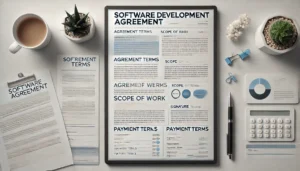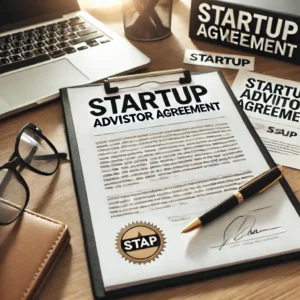What is an Evaluation Agreement?
An evaluation agreement, also known as a ‘pilot agreement’ or ‘trial agreement’, is an agreement between 2 or more parties (sides), in which the parties agree to test and evaluate a product or service, usually with the intention of one party buying the tested service (or investing in the company who created it), if the results of the evaluation process are good. The use of the service that is being tested is usually limited by time and scope of use. Meaning limited features or a limited amount of users.
* To keep things simple, let’s use an example of a service (not a product), and that the service is software.
Why would a company or a startup (that created the software) want to have an evaluation agreement with another company (a potential client)?
There are 2 main reasons:
- Initial sales/customers: startups trying to sell software which hasn’t yet been sold to known and respected customers in the market, often have a hard time selling to new customer’s, who are cautious of using software that hasn’t been tested outside of the startup’s labs. In such a case, the startup has an interest to offer the potential customer a trial run, or evaluation period, during which the potential customer can test the software. Then, assuming the trial period is successful, the potential customer will purchase the software. The software is usually tested with a limited scope at first, to minimize the risk of any potential damages to the potential customer’s business.
- Testing the waters: many startups need to test their software in a real environment, and not only in their controlled environments. The best way to do so, is by running a limited evaluation period with potential customers in their target market.
Ok, I get why startups would be interested, but why would a company be interested in running a pilot with a startup or small business?
-
- The company needs a solution to one of its’ business problems or challenges, and the only companies offering such solutions are new in the market (startups) which haven’t yet proven their
 software, or, the company isn’t sure that the software being offered is a good fit for its’ needs. In such an event, the best solution for the company is to first test the software during an evaluation period, before purchasing it.
software, or, the company isn’t sure that the software being offered is a good fit for its’ needs. In such an event, the best solution for the company is to first test the software during an evaluation period, before purchasing it. - Companies are always looking to invest in innovative solutions that will help them advance their business. Sometimes these solutions are created in-house (meaning by the company itself), but often the company will purchase a smaller company, or invest in it, or purchase a startup’s technology. Before they do so, and in order to be sure that the technology works and does what the company needs, they will often run an evaluation.
- The company needs a solution to one of its’ business problems or challenges, and the only companies offering such solutions are new in the market (startups) which haven’t yet proven their
Why do I need an evaluation agreement?
Many of my clients ask me why they can’t just finalize the deal with a handshake, and as much as I miss the days when multimillion dollar deals where agreed that way, unfortunately, times have changed. Today, people are quick to sue or turn to legal solutions, and the business etiquette of the past just isn’t the same. Just imagine that the software installed by the startup mistakenly deletes important information from your client’s database, or that it enables hackers to damage your client’s files. Or maybe your software ‘just’ causes your client’s website to crash for a few hours – causing substantial monetary damages. In order to protect yourself and your company, you need to have an evaluation agreement in place. Additionally, if you’re the startup, you want to prevent your customer from stealing the implementation and methods behind your idea. Now although this is rare, it can happen (watch this short movie trailer – it’s based on a true story)
Now that we have your attention, lets talk about the two types of evaluation agreements:
- An evaluation agreement which does not also include a purchase/license to use the software/product afterwards (“Short Evaluation”).
- An evaluation agreement which does include a purchase/license agreement to continue using the software/product (“Long Evaluation”).
With the Short Evaluation agreement, once the evaluation is completed, either each party goes their own separate way (if the results weren’t good), or the parties need to sit and negotiate whether or not the potential customer (the company) is going to purchase the software. And if they are, then under what terms (price, quantity etc.).
With the Long Evaluation agreement, there are additional sections that cover the purchase or license to use the software. Meaning that the entire agreement – including the purchase or license sections, is negotiated before the evaluation period begins. This means that there is no need for the parties to re-negotiate the terms of purchasing the software once the pilot period is done, because they have already defined the required results which activate the purchase/license agreement.
Which type of evaluation agreement is preferred?
Both agreements have advantages and disadvantages.
The Short Evaluation agreement saves a lot of time and money (mainly from a legal perspective) seeing how it covers less aspects, and therefore requires less negotiation time. This is important when (1) one or both sides are paying high legal fees, (2) either side is in a hurry to get started, or (3) the potential customer (the company looking to try your software) doesn’t have much ‘patience’ for back and forth negotiations with you and in doing so you (the startup) may risk losing the deal.
The disadvantage of starting with a Short Evaluation agreement is that if the pilot period is successful, you will now have to begin negotiating the purchase agreement of the software – which will take time and money anyway. The advantage of the Long Evaluation is that it saves you time and money re-negotiating the purchase agreement after you’ve done the evaluation.
The disadvantage is that it may often lead to tension due to the extended negotiations, and you may need to amend the agreement after the evaluation (more time and money) because at the time of signing the agreement (before the evaluation was done), you didn’t yet know all the figures and facts (for example, you may not know how successful or unsuccessful your product is – especially if you’re a startup).
Whichever agreement you select, really depends on your specific situation. If you know it’s going to be difficult ‘getting in the door’ with the potential customer, and you’re confident of the results, it is better to use the Short Evaluation agreement. This will help prevent the deal from getting stuck with the customer’s legal department (which might eventually lead to the trial period never happening).
On the other hand, if you’re dealing with a potential customer that is more flexible (or their lawyers are more easy going – I know, hard to believe right?), then it is advised to use the Long Evaluation agreement. Because that way you get the negotiation over and done with in one round of negotiations.
In my opinion, if you believe in your service, then another big advantage of using a Short Evaluation agreement (the one without the purchase sections) is that if the evaluation is successful, then you will have the upper hand in the negotiation because the potential customer will be a lot more interested in your sewrvice after seeing the good results. This is more of a business aspect, but it of course also affects the legal one.
The most important aspects that the evaluation agreement must cover (agreement without a purchase agreement):
Disclaimer: although these are the main issues, it is definitely not enough to only cover these, and you are highly advised to seek legal counsel before signing or drafting an evaluation agreement. As they say: the devil is in the details.
- Purpose of the evaluation. It is important that you clearly define the purpose of the evaluation – exactly what service or product is being offered, and what this service is supposed to do.
- Intellectual Property (“IP”). This is one of the most important aspects. The Oxford dictionary (roughly) defines Intellectual property as a work or invention that is the result of creativity, such as a manuscript or a design, to which one has rights to, and for which one may apply for a patent, copyright, trademark, etc. Example: the company or person who created the service or product usually owns the software or product because he/she/they created it.
It is crucial that the evaluation agreement (a) define what is included under the definition of “Intellectual Property”, (b) that this definition be as broad as possible, (c) that it is clearly stated that each side owns it’s IP, (d) and that the other party has no rights (and will have no rights after the evaluation) to the other side’s IP.
It is also important that feedback, results and any other data resulting from the evaluation be given to the startup, from the potential customer, and that this information be defined as the intellectual property of the startup (the company providing the service or product). The main reason for this section is to protect each side’s IP, and to prevent the other side from unlawfully using the other side’s IP without their permission (for example, the startup offering the software wouldn’t want to find out a year after the evaluation, that the potential customer, just ‘happens’ to have created the exact same software.One last important aspect relating to the IP, is that the agreement needs to define who owns any improvements made to the product or service due to the evaluation. For example, if the potential customer provided information that lead to the improvement of the software, the startup wouldn’t want the company to be able to claim that they have IP rights to the improvements.
- Return of IP and confidential information. In many evaluations, intellectual property and confidential information (for example files, code, designs, etc.) is transferred from one side to the next. It is important that the evaluation agreement clearly state that once the evaluation ends, both sides return any and all IP, and/or destroy all confidential information.
- Term of the evaluation. When the evaluation begins, and when it ends.
- Expenses. If there are expenses occurred due to the evaluation, who pays them, how (cash, bank transfer?) and when (before or after the evaluation period ends)? This may include implementation expenses, servers, transportation, consultants and employees, licenses etc.
- Evaluation and review of the evaluation process. Who evaluates the results of the evaluation process? When is this done – during or only after? Is the evaluation of the results supervised or not supervised? Filing of reports?
- Disclaimers and limitation of liability. During the evaluation, the company offering the service or product may cause damages to the potential client in the event that something goes wrong. Therefore, it is crucial that your evaluation agreement include a section which covers you (the startup) from having to pay for any such damages, or at least, limit the damages to an agreed compensation price. If you’re the company using the services or products, it is best to mention which damages are reasonable, which are not, and what the agreed compensation will be.
Can I draft the evaluation agreement myself?
Theoretically? Yes. Should you? No. As with many other types of agreements, if you’re a fairly intelligent person, and you do your research, you will be able to draft almost any type of agreement. But the true value of using an attorney are (1) in the small legal details of the agreement (which you will probably miss), and (2) the added business value that he/she gives you – assuming that they have the right experience.
Feel free to contact us. Good luck with your product or service.



